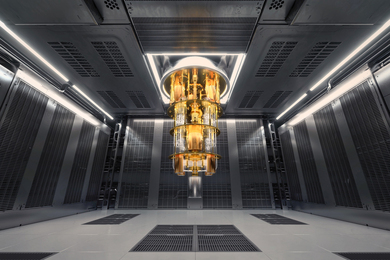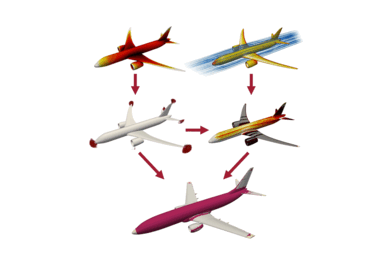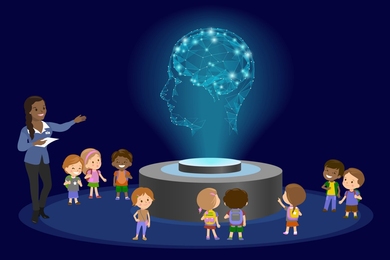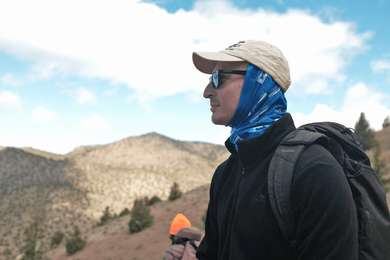In an effort to share what is known, what isn't, and what can and cannot be done about climate change, MIT's John Reilly and Kerry Emanuel joined UMass Amherst researchers last week as part of a "Global Warning" panel convened by The Boston Globe.
The Thursday — a cold, early April day — came just weeks after Boston experienced record heat. Yet despite prodding by their moderator, the Globe's environment writer David Abel, the panelists were quick to point out that no specific weather events could be linked to climate change. That's because of the climate's natural variability — just one of the many challenges that come with explaining climate change.
"Climate varies, just like the weather," said Kerry Emanuel, MIT's Cecil and Ida Green Professor of Atmospheric Sciences. "So in a global warming scenario, it is still possible to have long spans of cooling, maybe even as much as 30 years."
On top of that, the United States only makes up about 7 percent of the Earth, so we only experience a very small portion of the climate, said Ray Bradley of the UMass-Amherst Climate Systems Research Center.
"So when we were having the winter that wasn't, Eastern Europe was facing extreme cold," Bradley said.
Bradley noted that as he went on in his career and saw a rise in temperatures, and at the same time the "relentless" rise in greenhouse gases, it became obvious that there was a real physical connection between greenhouse gases and the change in climate. Unfortunately, some politicians have rejected that science, he said.
"The argument seemed to be if you could shut down these scientists, if you could make these scientists look like fools and charlatans, then this would create doubt that the science was not sound, that global warming was being fabricated, and that this would erode political efforts to control greenhouse gases," he said.
Paying the price in the United States
The price of doing nothing about climate change is huge, but the price of doing things inefficiently is also costing us, said economist John Reilly, the co-director of MIT's Joint Program on the Science and Policy of Global Change.
He compared the situation to a late-night commercial for exercise equipment. The commercial says that "for only 10 minutes a day you're going to have abs of steel and you're going to lose 40 pounds. Then you get the manual and it says, 'No, you really need to go on a diet as well.'"
"So advocates want solar and wind. Are they part of the solution? Yes," Reilly said, but they are expensive. "The unwillingness to accept the fact that it's going to be more expensive is a major problem in terms of moving ahead."
UMass alternative fuel researcher George Huber agreed: "There are new renewable energies that have come about, but all these technologies cost money. As an engineer, we say here's your solution, here's what it's going to cost and it's up to the market to decide if they want to pay that."
But Reilly noted no market can work all by itself, and that there needs to be rules.
"Cap and trade was an invention of American economists as a way of making the market work for us," Reilly said.
Reilly contrasted a cap and trade system, or its rough equivalent a direct tax on greenhouse gases, with currently-proposed policy measures such as new vehicle fuel standards. He said these standards are inefficient because they only focus on new vehicles and they apply just to the transportation sector when the electricity sector makes up most of the emissions. They are also more expensive, Reilly said, noting that on our current path of using inefficient technology standards it would cost in the trillions of dollars between now and 2050 to reduce emissions by 30 percent.. Under a greenhouse gas tax, that same reduction would cost about $500 billion.
"Is it worth it to accept GHG taxes to save several trillions of dollars? I think so," Reilly said. "But apparently people would like to hide the cost in government subsidies and other sorts of things rather than face the higher cost. These subsidies ultimately cost us as taxpayers. So we are paying a high price to not see the price we are really paying."
Finding global solutions
The United States created the idea of cap and trade, Reilly said, and this efficient approach is being picked around the world, China for one. But "just as many of our best innovations are produced in China, they may beat us in implementing such a system."
And China is not alone. Brazil and Korea are also looking into the idea. Many other nations have already taken critical steps to reduce their emissions.
While Reilly views this organic growth in policies as a good thing because international agreements are rarely successful — and because most of the growth in emissions will come from fast-growing nations such as China and India — here in the United States "we're really being left behind," he said.
Emanuel pointed out that this bottom-up thinking is happening within our own government, it's just less visible.
"Despite what you hear, our defense department takes climate change very seriously and what they are worried about is political destabilization driven by chronic food and water shortages, which they see as a major security threat to this country," Emanuel said. "They may not be making a lot of public noise about this, but they're quietly working on it."
The Thursday — a cold, early April day — came just weeks after Boston experienced record heat. Yet despite prodding by their moderator, the Globe's environment writer David Abel, the panelists were quick to point out that no specific weather events could be linked to climate change. That's because of the climate's natural variability — just one of the many challenges that come with explaining climate change.
"Climate varies, just like the weather," said Kerry Emanuel, MIT's Cecil and Ida Green Professor of Atmospheric Sciences. "So in a global warming scenario, it is still possible to have long spans of cooling, maybe even as much as 30 years."
On top of that, the United States only makes up about 7 percent of the Earth, so we only experience a very small portion of the climate, said Ray Bradley of the UMass-Amherst Climate Systems Research Center.
"So when we were having the winter that wasn't, Eastern Europe was facing extreme cold," Bradley said.
Bradley noted that as he went on in his career and saw a rise in temperatures, and at the same time the "relentless" rise in greenhouse gases, it became obvious that there was a real physical connection between greenhouse gases and the change in climate. Unfortunately, some politicians have rejected that science, he said.
"The argument seemed to be if you could shut down these scientists, if you could make these scientists look like fools and charlatans, then this would create doubt that the science was not sound, that global warming was being fabricated, and that this would erode political efforts to control greenhouse gases," he said.
Paying the price in the United States
The price of doing nothing about climate change is huge, but the price of doing things inefficiently is also costing us, said economist John Reilly, the co-director of MIT's Joint Program on the Science and Policy of Global Change.
He compared the situation to a late-night commercial for exercise equipment. The commercial says that "for only 10 minutes a day you're going to have abs of steel and you're going to lose 40 pounds. Then you get the manual and it says, 'No, you really need to go on a diet as well.'"
"So advocates want solar and wind. Are they part of the solution? Yes," Reilly said, but they are expensive. "The unwillingness to accept the fact that it's going to be more expensive is a major problem in terms of moving ahead."
UMass alternative fuel researcher George Huber agreed: "There are new renewable energies that have come about, but all these technologies cost money. As an engineer, we say here's your solution, here's what it's going to cost and it's up to the market to decide if they want to pay that."
But Reilly noted no market can work all by itself, and that there needs to be rules.
"Cap and trade was an invention of American economists as a way of making the market work for us," Reilly said.
Reilly contrasted a cap and trade system, or its rough equivalent a direct tax on greenhouse gases, with currently-proposed policy measures such as new vehicle fuel standards. He said these standards are inefficient because they only focus on new vehicles and they apply just to the transportation sector when the electricity sector makes up most of the emissions. They are also more expensive, Reilly said, noting that on our current path of using inefficient technology standards it would cost in the trillions of dollars between now and 2050 to reduce emissions by 30 percent.. Under a greenhouse gas tax, that same reduction would cost about $500 billion.
"Is it worth it to accept GHG taxes to save several trillions of dollars? I think so," Reilly said. "But apparently people would like to hide the cost in government subsidies and other sorts of things rather than face the higher cost. These subsidies ultimately cost us as taxpayers. So we are paying a high price to not see the price we are really paying."
Finding global solutions
The United States created the idea of cap and trade, Reilly said, and this efficient approach is being picked around the world, China for one. But "just as many of our best innovations are produced in China, they may beat us in implementing such a system."
And China is not alone. Brazil and Korea are also looking into the idea. Many other nations have already taken critical steps to reduce their emissions.
While Reilly views this organic growth in policies as a good thing because international agreements are rarely successful — and because most of the growth in emissions will come from fast-growing nations such as China and India — here in the United States "we're really being left behind," he said.
Emanuel pointed out that this bottom-up thinking is happening within our own government, it's just less visible.
"Despite what you hear, our defense department takes climate change very seriously and what they are worried about is political destabilization driven by chronic food and water shortages, which they see as a major security threat to this country," Emanuel said. "They may not be making a lot of public noise about this, but they're quietly working on it."










